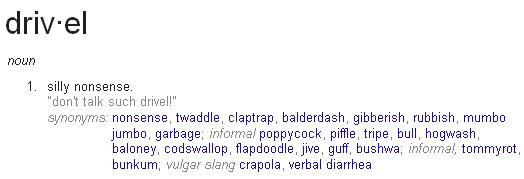I get it. It is hard not to react to information that just seems wrong. And it is hard not to show your disdain. How do I know that someone is writing from a place of disdain? By the words that they use.
Such as:
- nonsense,
- twaddle,
- claptrap,
- balderdash,
- gibberish,
- rubbish,
- mumbo jumbo,
- garbage,
- poppycock,
- piffle,
- tripe,
- bull,
- hogwash,
- baloney,
- codswallop,
- flapdoodle,
- jive,
- guff,
- bushwa,
- tommyrot,
- bunkum,
- crapola,
- verbal diarrhea.
These are synonyms for the word drivel.
My personal favorite is “flapdoodle”.
The problem is that by allowing disgust enter into your diatribe, you decrease the potency of your argument. Within an academic or professional arena, if you show negative emotion in your writing you are viewed as somewhat childish. Instead, and as we all know, degrading your opponent is normally reserved for more private communication or by passively-aggressively denying them access to some accolade. Now that is being a professional.
If you dislike or are not convinced by someone’s argument, then it behooves you to take the time to actually present a compelling case against their position. To say that the other’s position is no more than drivel — and to not back your statement with evidence — is to suggest that everyone else should be awed intrinsically by your superior intellect or sage-like wisdom. But that is just you collecting others who already share your perspective and need no further convincing.
De-emote your language. Carefully dissect their argument and then present your own. Let others decide for themselves.
And remember: you could be wrong.


You must be logged in to post a comment.